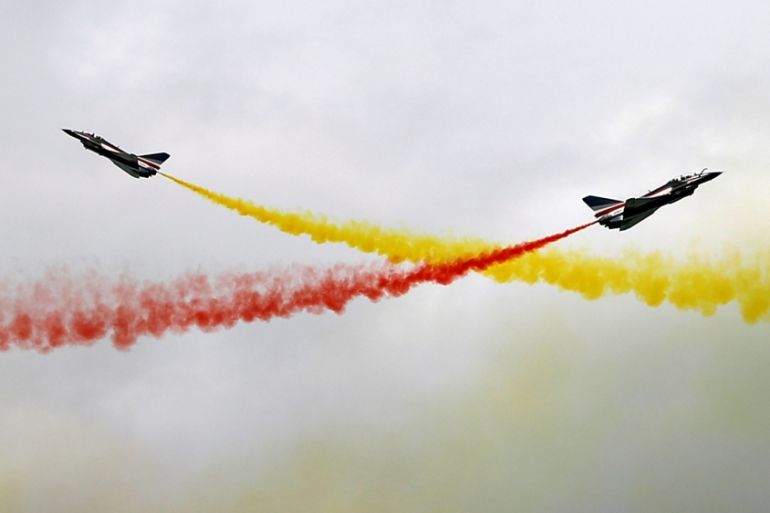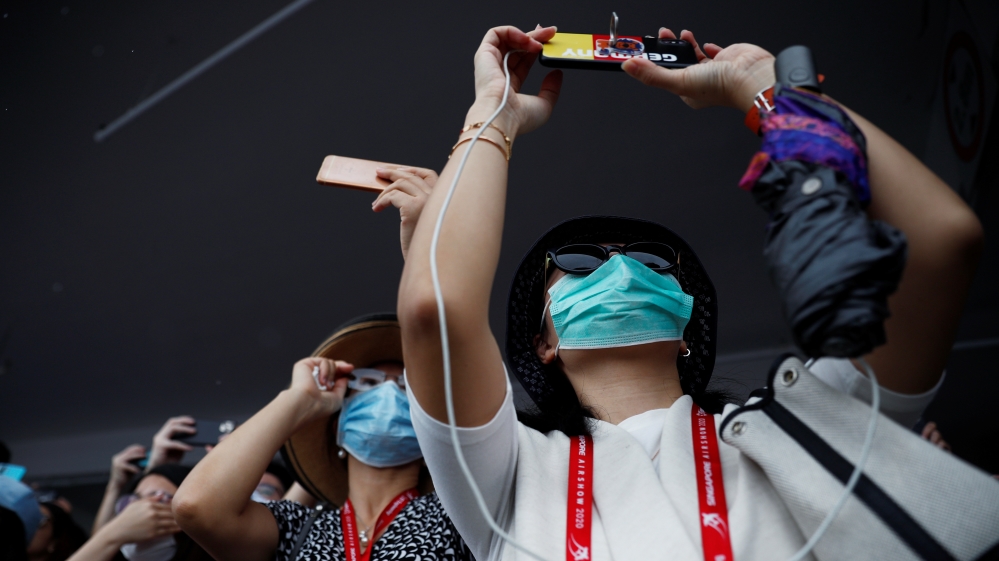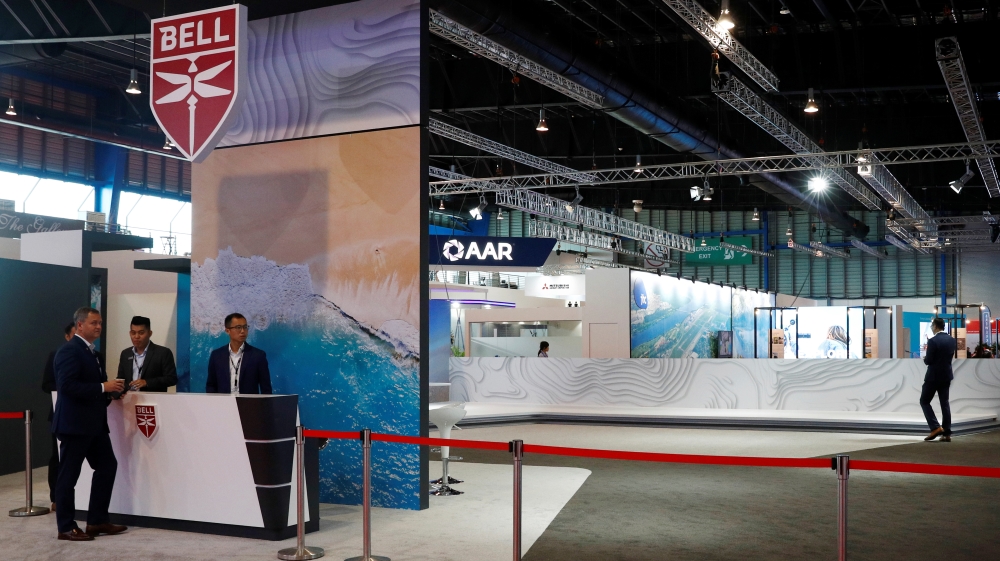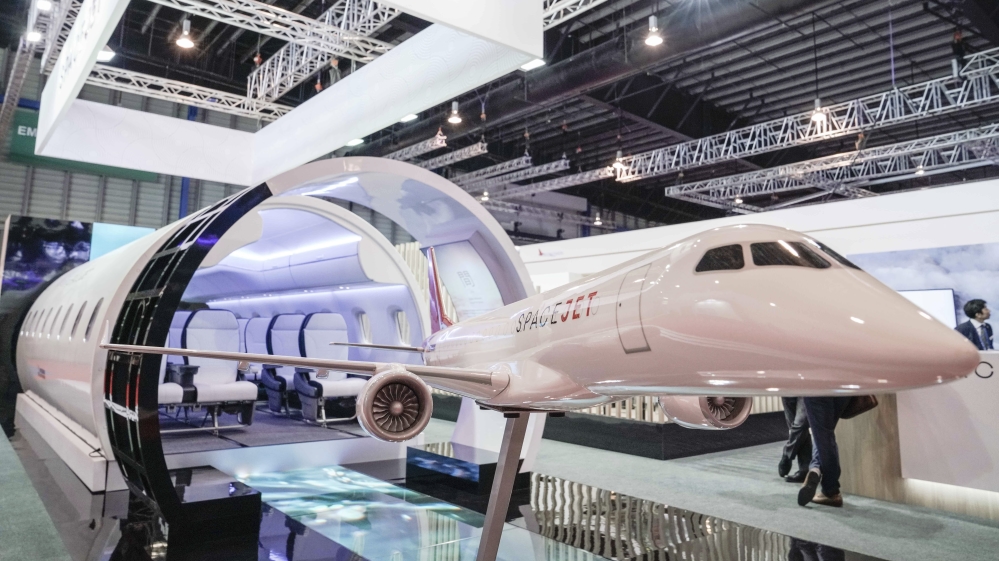Business, but not as usual, at Singapore Airshow
Asia’s largest aerospace and defence event sees drop in participants, attendance amid deadly coronavirus outbreak.

Singapore – The makers of next-generation military jets and civil aircraft gather every two years at the Singapore Airshow, billed as Asia’s largest aerospace and defence event.
Suppliers and customers attending the high-profile show typically discuss cutting-edge technologies and network in the hope of making multi-million-dollar deals, while being entertained by overhead fighter jet aerobatics.
Keep reading
list of 3 itemsCOVID-19: WHO names disease caused by new coronavirus
Weakest link: Global supply chains disrupted by coronavirus
This year, however, the 7th Singapore Airshow opened on Tuesday in the shadow of the outbreak of a deadly coronavirus leading dozens of companies to pull out. Officially known as COVID-19, the virus emerged in the Central Chinese city of Wuhan in December and has since spread to more than two dozen countries around the world, with Singapore having the second-highest number of cases after China.
More than 70 exhibitors were reported to have withdrawn, about eight percent of the roughly 1,000 firms originally slated to appear, including 12 Chinese companies facing restrictions on entry into Singapore, which banned arrivals from mainland China.
No-shows included US aerospace giant Lockheed Martin, Canada’s Bombardier and plane maker De Havilland. Other companies that withdrew include defence firms Raytheon Co, Bell, Gulfstream, Textron Aviation, Honeywell Aerospace, Viking Air and CAE Inc.
Overall, organisers of the show that will close on Sunday said there were some 930 exhibiting companies and close to 30,000 trade attendees, down from the 2018 event when more than 1,000 companies and more than 54,000 trade participants took part.

‘No contact’
Sean Lee, an Airbus spokesman, said it was worth being an exhibitor at the show despite the reduced turnout.
“We were able to meet many customers, military delegations and other stakeholders,” Lee told Al Jazeera. “It was worth coming for us.”
Another exhibitor, Simon Imanuel of Just Fly It, which makes educational aircraft models, said anticipated business was down by half. “It’s very quiet. People are worried. We are still around because we want to show people what we do,” he told Al Jazeera.
Still, several big-money business deals have so far been announced, including JTC Corporation’s contracts with aerospace companies worth $500 million Singaporean dollars ($359m). But it was unlikely that such agreements were sealed by a handshake – a “no-contact” policy has been enforced this year at the show in response to the viral outbreak.
There was, however, the widespread presence of temperature screenings, hand sanitisers, cleaning crews, some protective face masks, while doctors and medics were on standby for visitors who might feel unwell.

‘Organisers have done their best’
Some industry insiders and aviation enthusiasts who would normally have attended the airshow also chose to stay home and took issue with Singapore’s decision to allow the event to go on at a time when many people are avoiding public contact.
“The airshow should have been cancelled. Singapore has a moral responsibility to the world, not just an economic responsibility to its citizens,” Shashank Nigam, an aviation consultant who was raised in Singapore and lives in Toronto, wrote on his LinkedIn page.
Many of those who did the attend the public portion of the airshow on Saturday expressed mixed feelings about the reduced turnout and dampened expectations.
“To be honest, the trade is quite disappointing,” David Burke, an aviation enthusiast who travelled with his wife from New Zealand to attend the airshow, told Al Jazeera. “There’s not the exhibitors, there’s not the foot traffic.”
Families with young children were among those who had a chance to get up close to cutting-edge aircraft and watch the soaring aerial acrobatics overhead.
Jolin Ong, a Singaporean food blogger who came out to see the wide array of local foods on display on the sidelines, was among the many who expressed confidence in efforts to maintain health standards at the airshow.
“There’s no point in being so afraid and hiding at home,” she told Al Jazeera. “I’m sure the organisers have done their best in protecting everybody, with all the security and the temperature checking at the entrance.”

Several countries including Kuwait, Qatar, South Korea and Israel have issued travel advisories against going to the island nation, and many cruise lines are avoiding Singapore and other Asian ports.
The US Pentagon decreased the size of its delegation to the airshow. Those taking a pass included Undersecretary of Defence Ellen Lord, the Pentagon’s chief weapon’s buyer.
South Korean air force’s aerobatics teams also pulled out due to the outbreak. Yet despite Singapore’s travel ban on arrivals from mainland China, a Chinese military aerobatics team was allowed to enter the country to participate in the airshow.
Regular attendees such as Stephen Trimble, the defence editor at Aviation Week Network, said the airshow paled in comparison to previous ones.
“These shows function as a sort of speed-dating opportunity for meetings with suppliers and customers. Some executives, particularly Airbus, Boeing and the Israelis, still came, but the overall reduced presence made this show very different than any I had ever attended before,” he told Al Jazeera.
Among those who attended was Martijn Moret, co-founder of aviation startup AirFi, who was glad the show went on.
“As expected, it was quiet and I think many airlines stayed away. Business and prospecting is still conducted but I wonder how effective it was compared to other years. My personal expectation is that it would be even less busy, so was pleasantly surprised, and for me and AirFi the day was quite fruitful,” he told Al Jazeera.
Tan Kong Hwee, the assistant managing director of Singapore’s Economic Development Board, said in a prepared statement: “The presence of global players at the Singapore Airshow this year, in spite of the COVID-19 situation, reflects the importance and confidence that international businesses have placed in Singapore as a leading aerospace hub.”
Follow Tom Benner on Twitter @tgbenner